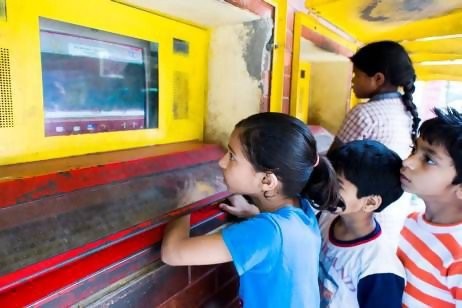
Pischetola (2020) explores the relationship between technology adoption and a teacher’s beliefs concluding ‘the most innovative teachers are those who conceive ICT as a cultural artefact, have an ecological view of the classroom, and translate their intentions into actions, facing uncertainty and possible failure’ (Pischetola, 2020). The link between pedagogy and epistemic beliefs is a key one that wasn’t addressed by the UK government in its Digital Education strategy (DfE, 2021). Too often school cultures view technology as a content delivery tool that became paramount for remote teaching during COVID lockdowns. In my organisation there is a vision from IT (Chief Information Officer) to have the digital embedded as part of the hybrid space; this inevitably has an impact on pedagogy. So essentially, we need the pedagogical needs to be driving the technological infrastructure. The technology will need to be upgraded due to the security issues it poses and the recent cyber attack which brought the Federation to a standstill. However, how this then supports developments in pedagogy will need to be explored. Pischetloa (2020) doesn’t consider the role of examinations and how schools are assessed shapes the thinking of many teachers and school leaders who may value digital skills and literacy but in terms of priority, rank exam performance higher. We end up with situations in which technology is used as a file repository system (Rienties et al., 2016). Also, in discussing hybrid spaces, Pischetloa (2021) missed the issue around boundaries to 247 learning spaces in the impact it may have on student/staff wellbeing which have been at the forefront of the pandemic (Mental Health Foundation, 2020). Pischetola (2020) ends her paper with two very vital questions: why some teachers more than others rethink their practice? How can we foster teachers’ reflection and change of beliefs to innovate teaching through the adoption of ICT?
References
DfE (2021) Realising the potential of technology in education: A strategy for education providers and the technology industry. Available at: https://eu01.alma.exlibrisgroup.com/leganto/readinglist/citation/32197485640002466?institute=44UOE_INST&auth=SAML (Accessed: 31 October 2021).
Mental Health Foundation (2020) Returning to school after lockdown, Mental Health Foundation. Available at: https://www.mentalhealth.org.uk/coronavirus/school-guidance-for-coping-with-coronavirus (Accessed: 15 November 2021).
Pischetola, M. (2020) ‘Exploring the relationship between in-service teachers’ beliefs and technology adoption in Brazilian primary schools’, International Journal of Technology and Design Education [Preprint]. doi:10.1007/s10798-020-09610-0.
Pischetola, M. (2021) ‘Teaching Novice Teachers to Enhance Learning in the Hybrid University’, Postdigital Science and Education [Preprint]. doi:10.1007/s42438-021-00257-1.
Rienties, B. et al. (2016) ‘Why some teachers easily learn to use a new virtual learning environment: a technology acceptance perspective’, Interactive Learning Environments, 24(3), pp. 539–552. doi:10.1080/10494820.2014.881394.




Thanks Saqib, I covered competences as well so it’s valuable to see your take on this.
I too picked up on the lack of discussion on assessments, especially as it is a key outcome for students. Did you have any issues in this particular area in your institution, or ones you work with/familiar with? I wonder if the challenges were the same as those we felt (lack of skills in certain areas, lack of proper process, no alternative solutions proposed etc.).
I think your final question is a cogent one; how might we draw together teachers’ values and beliefs with a changing landscape, whilst respecting both? I drew in ideas of empowerment; I wonder if you had any ideas on how teachers may be brought in to have material impact on the choices of tech, the ways they are used and future strategy planning in this area? Have you had experiences of this?
In my institution, programme directors (who are academics) do contribute to strategy in their presence at committees and working groups. However these are not specific to digital education or employment of technology; the latter decisions tend to be made locally, with the academics involved in course design. Again there is a level of disconnect in that the academic designing the course may not be the person teaching the course, and so the teacher may have to engage with tech that they feel is inappropriate or at odds with their values in teaching the course.
Wellbeing is such an important issue to raise in the context of competences since it can have a fundamental impact on it. The pandemic has had a huge impact on mental health, impacting on all stakeholders. Do you think this has affected the values and beliefs in education – for either students or teachers – that might impact on how they engage with their institutions? And how might this impact on competences? Do institutions need to consider mental health as an area of support which is as crucial, if not more so, than other skills training like ICT etc?
This is a useful discussion of the Pischetola paper. The prominence of assessment performance in the assemblages of schools is arguably not replicated in a higher education context so is useful to surface here. The importance of cyber-security and of (digital) mental health are components that have become more prominent over the last 18 months or so speak the dynamic nature of digital education strategy-making. Your two vital questions are well chose: to what extent might the responses to these questions be shaped by the wider processes and procedures of the organisation – in other words, is the individual teacher, their practices and personal perspectives, the best starting point for change?
Yes, many schools often see technology as a content delivery tool, especially during the coronavirus lockdown, when technology is crucial for distance learning. At that time, many schools in China used technology as a teaching tool, and in that emergency situation, there was nothing wrong with it. However, after returning to school and returning to traditional classes, few teachers will think about what distance learning should be and how to develop it. Why some teachers more than others rethink their practice? The embodiment of this problem. In my current organization, my leaders have a sense of better late than never. After returning to school, school immediately set up an online teaching research group to research and develop courses and teaching of Distance Learning. The current situation is more hybrid learning, summarizing while practicing.
That’s interesting – glad to see it continuing. The issues now seem twofold – a) facing another pandemic with a new Covid variant b) embracing technology to leverage existing classroom practices for a hybrid model, as Fullan suggests in his paper on Reimagining Education – from remote to hybrid learning
https://educationblog.microsoft.com/en-us/2020/06/reimagining-education-from-remote-to-hybrid-learning/
Saqib
Your post offers some interesting thoughts on competences in the context of institutional capabilities for digital strategy development. Like everyone in our group, I also covered competences, and it’s interesting to see other group members’ thoughts on the same issues, drawing on the same/similar readings.
You raise important issues in relation to assessment and people’s (student/staff) well-being. I would be interested in hearing about your own experience here (or that of others you are familiar with). Have you come across any research that might look into the well-being part in more detail? My personal experience of ‘online’ teaching has been somewhat more positive than hybrid because I feel somewhat more ‘in control’, e.g. I know my own capabilities, understood the digital aspects related to my courses, have a direct (online) relationship with my students (synchronous and asynchronous) etc. However, when it comes to hybrid, there are too many moving variable, giving me ‘less control’ over what happens and how I might ‘improvise’, engage learners equally etc. I also spend more time catching up on all the lose ends. Does hybrid teaching pose particular risks to teachers’ mental health (related to a perceived undermining of their competences based on a number of uncertainties) that may differ from the risks posed in online or face-to-face environments? Here, I use hybrid in terms of the teacher being physically present in the physical classroom, dealing with face-to-face students and online students at the same time.
What are your own thoughts in response to Pischetola’s questions about why some teachers more than others rethink their practice, and how we might get the teachers who are not currently rethinking their practice on board (if it is considered to be essential for them to come on board)?
Your post offers some interesting thoughts on competences in the context of institutional capabilities for digital strategy development. Like everyone in our group, I also covered competences, and it’s interesting to see other group members’ thoughts on the same issues, drawing on the same/similar readings.
You raise important issues in relation to assessment and people’s (student/staff) well-being. I would be interested in hearing about your own experience here (or that of others you are familiar with). Have you come across any research that might look into the well-being part in more detail? My personal experience of ‘online’ teaching has been somewhat more positive than hybrid because I feel somewhat more ‘in control’, e.g. I know my own capabilities, understood the digital aspects related to my courses, have a direct (online) relationship with my students (synchronous and asynchronous) etc. However, when it comes to hybrid, there are too many moving variables, giving me ‘less control’ over what happens and how I might ‘improvise’, engage learners equally etc. I also spend more time catching up on all the lose ends. Does hybrid teaching pose particular risks to teachers’ mental health (related to a perceived undermining of their competences based on a number of uncertainties) that may differ from the risks posed in online or face-to-face environments? Here, I use hybrid in terms of the teacher being physically present in the physical classroom, dealing with face-to-face students and online students at the same time.
What are your own thoughts in response to Pischetola’s questions about why some teachers more than others rethink their practice, and how we might get the teachers who are not currently rethinking their practice on board (if it is considered to be essential for them to come on board)?
Hi Saqib, please check your spam filter for my comments.
Done – should be sorted now